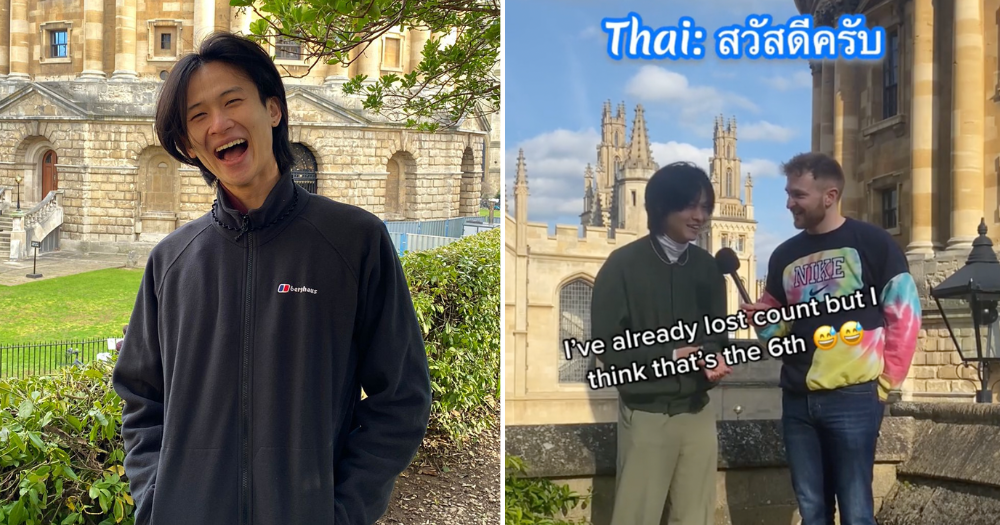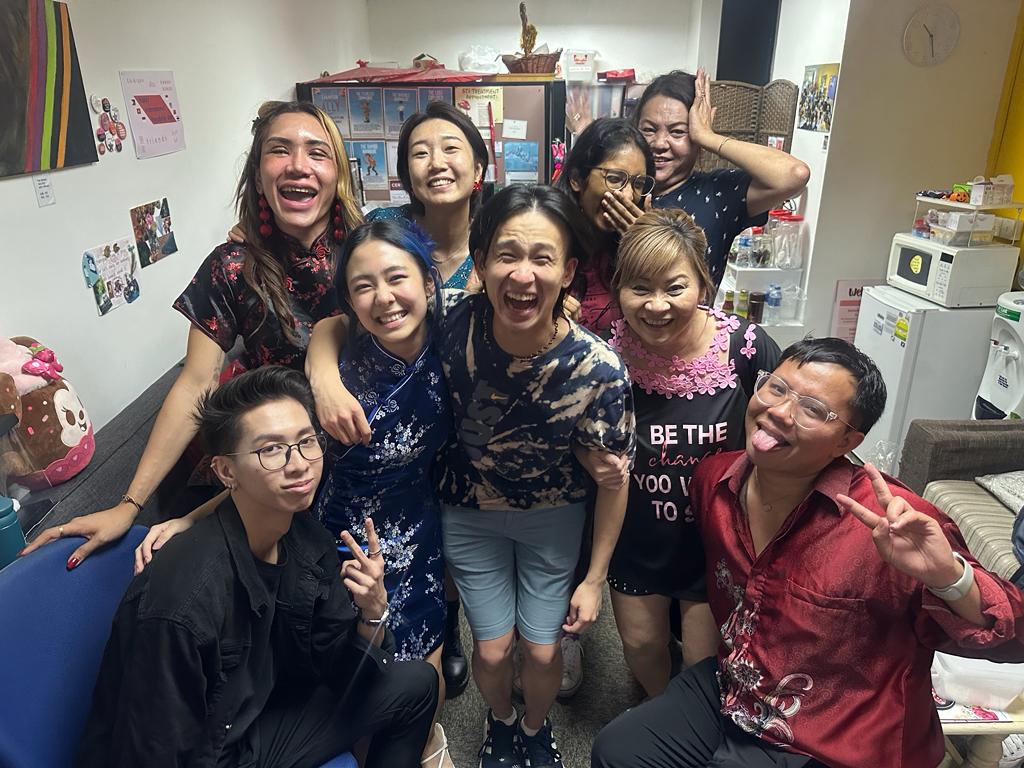- Joined
- Oct 30, 2014
- Messages
- 36,768
- Points
- 113

Being able to speak a maximum of two languages, plus a smattering of dialect, is the norm for most Singaporeans.
Jonas Fine Tan, 23, a psychology, philosophy and linguistics student is not the norm.
Tan's verbal prowess first came to light in an interview with fellow Oxford student Ollie on TikTok to showcase the life and diversity of Oxford students.
The Singaporean demonstrated he could speak 11 languages.
For the record, he speaks English, Mandarin, Malay, Hokkien, Tagalog, Thai, Tamil, Spanish, Portuguese, Italian, and Vietnamese.
The video has since racked up some 2.8 million views.
Bolstered by a passion, or self-professed obsession, for linguistics, and an awareness of the slow demise of certain languages around the world, the Oxford University student has multiple languages at the tip of his tongue.
Accents down to a tee and all.
His speech is tinted with an American accent, but midway through another video explaining how languages will always diverge into others, he slips back into Singlish to prove a point.
Was barely passing Mandarin in school
As someone who is effectively monolingual -- I never got the hang of Mandarin despite all those years of formal education and government campaigns, shame on me, I know -- I was more than impressed.
Speaking to Mothership from his room in the UK — in Singlish, might I add — Tan shared that his interest in languages started young, but he lacked the energy, time and motivation to pursue it.
"I've always been interested in languages, I think, from when I was a kid, but I never bothered to actually learn it to a high enough level for me to have any good use of it."
As a former student of Anglo Chinese School (Independent) (ACSI), Tan confessed that his "Chinese really cannot make it last time".
Describing himself as "jiak kantang" — a Hokkien and Malay term literally translated to "eat potato", usually referring to those who are more Westernised or fluent in English — Tan shared that he was the most "kantang" in a family that also spoke Malay at home, as his mother is Peranakan.
Events
Discover Eden Homes: Co-own a vacation home at 1/8 of the price
1 Jul 2023 1PM - 1 Jul 2023 5PM
Qanvast@OUE, 6A Shenton Way 02-09/10, #1 OUE Downtown Gallery, 068815
[Exclusive] TK TrichoKare’s Scalp Purifying Therapy Treatment
1 Jul 2023 - 31 Jul 2023
TK TrichoKare outlets
Mothership WhatsApp banner
Mothership Telegram banner
Being able to speak a maximum of two languages, plus a smattering of dialect, is the norm for most Singaporeans.
Jonas Fine Tan, 23, a psychology, philosophy and linguistics student is not the norm.
Tan's verbal prowess first came to light in an interview with fellow Oxford student Ollie on TikTok to showcase the life and diversity of Oxford students.
The Singaporean demonstrated he could speak 11 languages.
For the record, he speaks English, Mandarin, Malay, Hokkien, Tagalog, Thai, Tamil, Spanish, Portuguese, Italian, and Vietnamese.
The video has since racked up some 2.8 million views.
Bolstered by a passion, or self-professed obsession, for linguistics, and an awareness of the slow demise of certain languages around the world, the Oxford University student has multiple languages at the tip of his tongue.
Accents down to a tee and all.
His speech is tinted with an American accent, but midway through another video explaining how languages will always diverge into others, he slips back into Singlish to prove a point.
Much to the recognition and amusement of fellow Singaporeans.
Was barely passing Mandarin in school
As someone who is effectively monolingual -- I never got the hang of Mandarin despite all those years of formal education and government campaigns, shame on me, I know -- I was more than impressed.
Speaking to Mothership from his room in the UK — in Singlish, might I add — Tan shared that his interest in languages started young, but he lacked the energy, time and motivation to pursue it.
"I've always been interested in languages, I think, from when I was a kid, but I never bothered to actually learn it to a high enough level for me to have any good use of it."
As a former student of Anglo Chinese School (Independent) (ACSI), Tan confessed that his "Chinese really cannot make it last time".
Describing himself as "jiak kantang" — a Hokkien and Malay term literally translated to "eat potato", usually referring to those who are more Westernised or fluent in English — Tan shared that he was the most "kantang" in a family that also spoke Malay at home, as his mother is Peranakan.
Since Secondary 1, Tan had been studying Malay as a third language in school, but was "forced to drop it" as his results were "so bad".
Instead, the pivotal moment came when he was 15 — he chanced upon a YouTube video of an 18-year-old who was able to speak 20 languages, and thought to himself "Eh, this guy is quite cool."
"And I guess at that point in time, I was also like, being a bit of an idiotic teenager in a sense. I'm just like, okay, I'm gonna study this to look cool. Like try and be like him, because I'll be cool."
This aspiration to be recognised as someone others looked up to, or the desire to boost his street cred, sparked in Tan something new.
The first language he started learning on his own and outside of school was Spanish.
As he came to grips with it, there also came a point in time that his Spanish proficiency surpassed his native Mandarin.
"I was like eh, cannot la."
This compelled him to buck up on his Mandarin, and Tan managed to score a decent B3 for his O-Levels. Prior to that, he had been barely passing the subject.
The death of languages
Tan's after-school hobby slowly evolved into a full-time obsession.
He would spend hours poring over linguistics-related information online, and watching videos on YouTube to learn new languages.
"I think something that came out of it was that I realised I just really enjoyed the process of learning new languages and speaking to people, and I think I enjoy looking at the linguistic differences between them also."
Another video Tan found on YouTube further served to mould his interest and shape his focus on languages.
The video in question dove into the plight of a Native American tribe whose language had disintegrated over the years, to the point that only one person left in the tribe, and essentially the world, was capable of speaking it.
The video greatly moved Tan, and led him down a rabbit hole on the topic of language death, a term used to describe the steady decline in the use of a language.
This decline ultimately leads to the extinction of a language, where no native speakers remain.
The topic of language death bore some personal significance for Tan.
Dialects like Teochew and Hokkien are a dying tongue for many young Chinese Singaporeans.
After all, what can be said about our generation's Hokkien-speaking capabilities when one of the most commonly known turns of phrase is a vulgarity whose acronym matches the words "cool beans"?
I confess that I'm one of these young Singaporeans.
Despite the fact that I understand Hokkien to some extent, I often struggle to converse with my Hokkien-speaking grandparents.
To a similar extent, Tan shared that although his father is Hokkien, he never spoke the dialect either.
It was upon learning about the concept of language death that Tan started actively trying to learn Hokkien while he was in junior college.
In response, Minister for Communications and Information Josephine Teo shared that dialect content is limited on these platforms "to support the prevailing language policy of Mandarin as one of the four official languages".
"There are currently no plans to allow more dialect programmes on FTA TV and radio. Such content is available on other platforms such as pay TV and over the Internet and if I may add in plentiful supply," Teo elaborated.

And although he hasn't reached the level of competency required to speak these languages, he can also read Arabic, Kurdish, Hindi, Bengali, Korean, Japanese, Russian and Mongolian.
Rewiring the brain
After completing his National Service, Tan decided to pursue a bachelor's in psychology and linguistics at Oxford.
His interest continued snowballing, and now, Tan can confidently say that, aside from English and Mandarin, he is fluent in Spanish, Portuguese and Thai.
A step down from that, Tan can also speak Tagalog, Malay and Hokkien, while he can express himself to a limited extent in Tamil, Vietnamese and Italian.
Majority of these Tan spent learning on his own, turning to online tutorials and platforms which allowed him to interact with language tutors live.
Realising that he has always liked community work too, Tan has since found a way to meld his two passions, which is to volunteer as a translator.
As his father works in the construction industry, the older man pointed out to Tan that many migrant workers required translation help.
Thus, during the height of the Covid-19 pandemic, Tan decided to use what limited Thai he knew to translate government announcements for migrant workers who were housed on cruise ships at the time.
He would also help translate any queries or concerns the workers had about their insurance or remittances, terms which he had to learn on the job.
Due to the "urgency of the situation where [he] had to be there for people", Tan said that this pushed him to improve his Thai to a "high level".
Whenever Tan returns home, he also volunteers with a local non-governmental organisation which supports sex workers in Singapore.
Although Tan went in expecting to provide Thai translations, he was posted to Joo Chiat, where there is a higher concentration of Vietnamese sex workers, which therefore prompted him to start learning Vietnamese as well.
He chuckles:
"[This] is why my knowledge of Vietnamese is very limited. And it's also very weird because I know how to say things like 'condom' or 'STI', but I don't actually know how to say things like, 'carry something'."
Reactions to Tan's mastery over the various languages has ranged from stoicism to outright awe.
Speaking Tamil in particular, gets him pretty big "Wow!" reactions from Singaporeans, Tan admits.
"People are always like, 'How you read the curly whirly thing?'" and Tan recalls most Indians in Singapore are simply surprised "that a Chinese person will bother".
In fact, of all the languages he's learned thus far, Tamil was the hardest to pick up due to a lack of resources.
Tan actually started on the basics by buying a Primary 1 Tamil textbook.
This learning process was made even tougher by the fact that Singaporean colloquial Tamil isn't actually documented in any books, and Tan couldn't go around pestering his Singaporean Tamil-speaking friends on language tips.
https://mothership.sg/2023/07/oxford-polyglot-tiktok/

